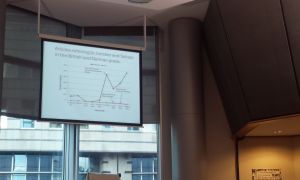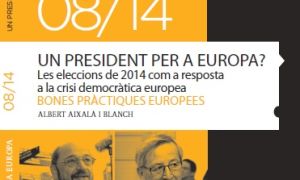On Tuesday, May 26, the Foundation presented the study "A President for Europe? The 2014 elections as a response to the democratic democratic crisis" at the European Parliament's headquarters in Brussels with Jaume Duch, spokesman for the Parliament, Ernest Maragall MEP and the Director of the Foundation, Max Vives.
The study, prepared by Albert Aixalà, analyzes the selection process of candidates for the presidency of the European Commission by the five main European parties, as well as the campaign of these candidates (Jean Claude Juncker, Martin Schulz, Guy Verhofstadt, Ska Keller and Alexis Tsipras) throughout the EU during the months of March, April and May 2014, and their level of knowledge among citizens.
One of the main conclusions of the study is that the campaign of European heads of list was very unequal between the countries of the Union but that where the electoral campaign became more European -with televised debates between the candidates to preside over the Commission and a presence important in the media-increased the interest of the public for these elections and increased participation significantly. In this sense, the strong Europeanization of the electoral campaign in Germany stands out, in contrast to the almost absolute absence of the five candidates to countries such as the United Kingdom, Holland or Poland.
Jaume Duch emphasized the positive assessment that European citizens have made of this process of election of the new president of the European Commission, according to the data of the post-electoral study commissioned by the Parliament, and reaffirmed the commitment of the European Parliament with the reinforcement of this democratic mechanism of election of the president of the Commission through the elaboration of a European electoral law during this mandate.
The presentation was also attended by the general secretary of the European Green Party, the director of the European Free Alliance, as well as researchers from the Martens Center for European Studies - linked to the European People's Party -, the Center for European Policy Studies (CEPS), and the Vote Watch Europe organization, among others.
The presentation ceremony coincided with the first anniversary of the elections and with the dissemination by the European Parliament of a video interviewing the candidates explaining where the idea of ??the spitzenkadidaten (list heads) came from and how the campaign was carried out electoral.










